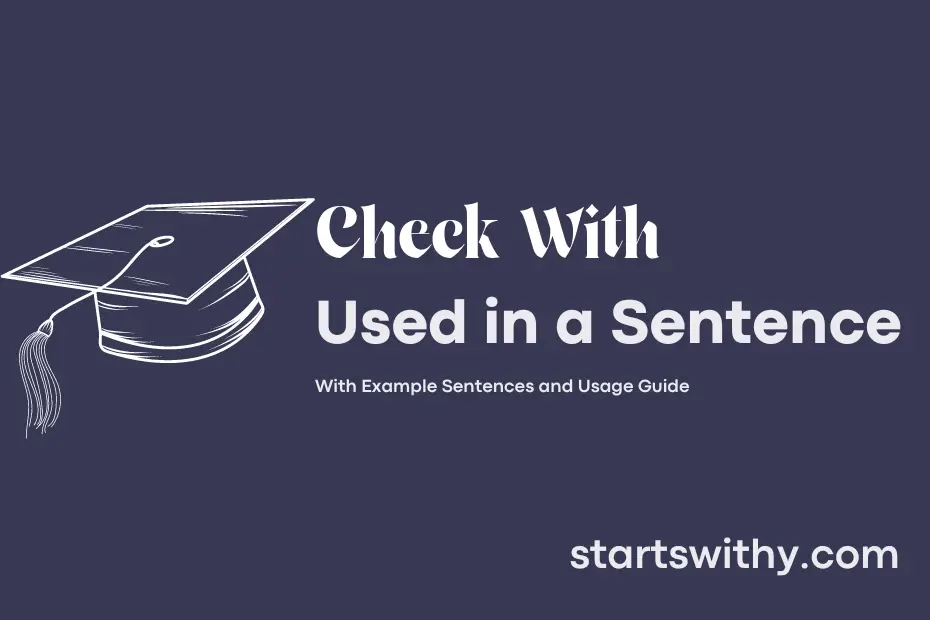When unsure about a particular matter, the phrase “check with” is commonly used to suggest verifying information or seeking confirmation. This phrase is often employed to highlight the importance of a double-check or to ensure accuracy before proceeding with a decision or action.
Whether you are confirming a schedule, verifying a fact, or seeking approval, using “check with” in your conversations can help you seek the necessary reassurance or validation before finalizing your plans.
7 Examples Of Check With Used In a Sentence For Kids
- Check with your teacher before using any new art supplies.
- Make sure to check with your parents before sharing any personal information.
- Check with a grown-up before going outside to play.
- Remember to always check with a teacher before leaving the classroom.
- It’s important to check with an adult before trying any new games.
- Check with a friend before borrowing their toys.
- Before taking any snacks, make sure to check with your parents.
14 Sentences with Check With Examples
- Check with your professors about the format of the final term paper.
- Before making any travel plans, check with your classmates about the exam schedule.
- Check with the library staff to see if the book you need is available for borrowing.
- It’s a good idea to check with your seniors for advice on which elective courses to take.
- Check with the student council for information on upcoming campus events.
- Before purchasing any expensive software, check with your department for possible student discounts.
- Check with your roommates before hosting a study group in your dorm room.
- Check with your academic advisor to ensure you meet all graduation requirements.
- Before submitting your research proposal, check with your mentor for feedback.
- Check with the career center for internship opportunities in your field of study.
- Check with the IT department for troubleshooting tips if you encounter technical issues with your laptop.
- Check with the housing office for details on room assignment processes.
- Check with your friends for recommendations on affordable eating options near campus.
- It’s a good idea to check with the college bookstore for information on textbook buyback policies at the end of the semester.
How To Use Check With in Sentences?
Check With is used to ask for confirmation or verification from a person or source. When using Check With in a sentence, remember to follow these simple steps:
- Identify the person or source you want to verify information with.
Example: “I will check with the manager to see if the item is in stock.”
- Place Check With at the beginning or end of a sentence, followed by the person or source you are confirming with.
Example: “Check with Sarah before making any changes to the schedule.”
- Use Check With in a polite and respectful manner when seeking clarification or confirmation.
Example: “Please check with your teacher before bringing any additional materials to class.”
- Remember to use the appropriate verb tense with Check With, depending on the context of your sentence.
Example: “I will check with my supervisor tomorrow to get approval for the project.”
By following these guidelines, you can effectively use Check With in a sentence to ensure accurate information and maintain good communication with others.
Conclusion
In conclusion, incorporating sentences with “check with” into your writing can be a useful way to indicate the importance of verifying information or obtaining confirmation from a reliable source. This phrase serves as a reminder to ensure accuracy and reliability, especially in professional or formal contexts. By using sentences like “You should check with the manager before making any reservations” or “Please check with your doctor before starting any new medication,” clarity and accountability are promoted.
Overall, sentences with “check with” help to establish a culture of double-checking facts and seeking approval before proceeding with decisions or actions. This simple phrase encourages a proactive approach to information gathering and decision-making, ultimately leading to more informed and reliable outcomes in various settings.



